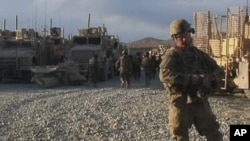Top U.S. defense officials are putting together a plan to begin reducing the American military presence in Afghanistan, starting in July. The killing of al-Qaida leader Osama bin Laden has led some members of Congress to call for a faster withdrawal than the military had expected. Senior officers are becoming more confident in their comments on the status of the war, but they say a withdrawal that is too fast will risk the gains made during the past year.
Pentagon officials still use the phrase “fragile and reversible” to describe progress in Afghanistan. They are proud of security gains in former Taliban strongholds, but they say they will not begin to know how stable those gains are until after this year’s summer fighting season, which is just beginning.
Already, the Taliban has launched two large-scale attacks.
But in this war, civilian factors are as important as military ones in determining whether the hard-won progress will stick. U.S. Marine Corps Major General Richard Mills recently returned from a year of commanding coalition troops in and around Afghanistan’s southern Helmand Province, which has been a Taliban stronghold for years. “I am confident it is going to stick because of the investment the local Afghan people are making, sending their children to school despite threats. That is a real investment in that system to spite the fact the insurgent might not want you to participate," he said.
At a gathering at Washington’s Atlantic Council, Mills spoke of security gains and improvements in the Afghan Army and police forces. But he spent a lot of time talking about the popularity of programs aimed at providing health care, creating jobs and opening schools.
“When people ask me, ‘Are things reversible over there, are things going to slide back?’ my answer is one of the metrics you want to look at is that education piece, because the insurgent has told the parents, ‘Send your kids to school, we will kill you. If your kids go to school, we will kill them.’ And yet the parents invest their children in that future and send those children to school," he said.
General Mills acknowledges many problems remain in Afghanistan, including corruption that he believes contributed to a huge prison break last month in Kandahar. But he says overall, he left Afghanistan feeling pretty good about the progress there, and scheduled nearly a dozen public appearances to talk about it.
At the Center for Strategic and International Studies, senior analyst Anthony Cordesman, a critic of Afghanistan strategy for many years, agrees there has been what he calls “very real progress” this year. But in a VOA interview he focused on one of many problems that remain. “While we are building something up that can be highly effective in dealing with the military side, and may help with the police, the other side of this is still missing. We do not have governance in place, in the form of Afghan local and district government, at anything like the level required," he said.
But Cordesman says the U.S. strategy has made an important shift in recent years, moving away from trying to impose American-style democracy and capitalism, and toward more modest and more achievable goals. “You look at the detailed plan and what does it talk about? Providing enough governance, enough security, so the Afghan people can function by their standards, on their terms, getting rid of the Taliban, al-Qaida and other extremist groups as a threat that the Afghans can not deal with or which will threaten the outside world, and giving Afghanistan the opportunity to develop on its own terms. That, we may be able to get to," he said.
The U.S. and NATO goal is to get to that point by 2014, when Afghan forces are scheduled to take full security responsibility for their country. Cordesman says the goal can only be accomplished by tailoring military, police and civilian institutions to conform to Afghan culture.
General Mills says that is what the U.S. military is trying to do. “We have approached this a bit differently than we have some other conflicts in that we have carefully brought in the local elders, brought in the local leadership, to tell us what is it they want, what do the Afghan people want. Then we have built those institutions, as opposed to imposing what maybe the United States or the coalition might think is important on them," he said.
Many experts and generals say that the surge of U.S. and allied troops last year finally put the capability in place to make potentially lasting progress.
But with that surge came President Barack Obama’s promise to begin reducing the U.S. troop level in Afghanistan by this July, a process officials have always said would be gradual and based on the security situation in various parts of the country. They say events during the rest of this year will begin to show whether the security and civilian improvements brought by the troop surge are solid, and whether the withdrawal can move more quickly than planned.




